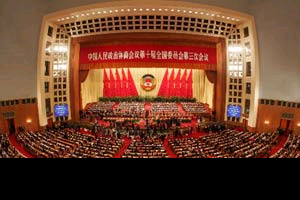
China's top advisory body, the National Committee of the
Chinese People's Political Consultative Conference (CPPCC), convened its annual
full session here Thursday. (Xinhua photo)
China's top advisory body, the National Committee of the Chinese People's
Political Consultative Conference (CPPCC), convened its annual full session here
Thursday afternoon, laying much stress on the role it can play in promoting
national reunification and social harmony.
"We shall bring into full play the
unique function and role of the people's political consultation..., contribute
to the building of a harmonious socialist society..., oppose and curb 'Taiwan
independence' activities and safeguard peace and stability in the Taiwan Straits
region," said Jia Qinglin, chairman of the CPPCC National Committee, while
delivering a keynote report on what the advisory body should do in 2005.
All
top leaders of the ruling Communist Party and the state, including President Hu
Jintao, top lawmaker Wu Bangguo and Premier Wen Jiabao, were seated on the
central rostrum when the session opened in the Great Hall of the People in
downtown Beijing at 3 p. m. Thursday.
Founded in 1949, the CPPCC consists of
elite members of the Chinese society who are willing to serve as the think tank
for the government and for the country's legislative and judicial organs.
As
an open forum where the Communist Party of China (CPC), the non-Communist
parties of China and people without party affiliation discuss state affairs
freely and on an equal footing, the CPPCC is also regarded as a perfect
interpretation of China's "socialist democracy".
However, Jia, also a member
of the CPC's top decision-making body, the Standing Committee of the Political
Bureau of the CPC Central Committee, also reaffirmed the unshakable leadership
of the CPC over the advisory body.
"Adherence to the leadership of the CPC
provides a fundamental guarantee for the healthy development of the cause of the
CPPCC," he told the 2,186 advisors from all over the country.
An important
job for the advisors during their 9.5-day full meeting, scheduled to last till
March 12, is to discuss and offer advice on the draft version of a law the
country's top legislature, the National People's Congress (NPC), plans to enact
to prevent the separation of Taiwan from China.
The enactment of the
anti-secession law has been put on the agenda of the upcoming annual full
session of the NPC, slated to begin in Beijing Saturday. As usual, all members
of the CPPCC National Committee are invited to participate in the lawmakers'
meeting as non-voting observers.
"Some non-Communist parties and CPPCC
members have, at CPPCC meetings or in their proposals, called for the enactment
of a law against secession at the earliest date, to resolutely fight and curb
'Taiwan independence' activities in any forms," said Jia when reviewing the
advisors' work and contributions in the past year.
Many advisors also worked
hard to help the Taiwan compatriots understand and support the central
authorities' policies regarding Taiwan, and helped them dismiss their "doubts
and misunderstandings" on certain matters concerning the policies, Jia
added.
In 2005, CPPCC members should further strengthen their ties with the
people of various social circles and groups in Taiwan and "do more work to win
the heart of the Taiwan people", Jia urged.
Echoing the top leadership's
latest call for more social harmony and a better social order, Jia told the
advisors that the CPPCC, which represents the "broadest united patriot front in
China," "should and could play an important role in this regard".
The CPPCC
can help the Party and government coordinate social relations and maintain
stability, and can also help the state fully implement its ethnic and religious
policies, said Jia.
As China is wrapping up its "10th five-year plan" period
and working out the "11th five-year plan" this year, helping the Party and
government formulate a good social and economic development plan for the five
years to come shall also become a focus of all advisors' work, Jia
added.
According to sources with the CPPCC National Committee, the advisors
participating in the session have so far submitted nearly 600 proposals and
suggestions, in which "the building of a harmonious socialist society" turns out
to be a "highly popular term".



